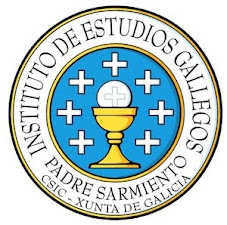4th International Colloquium Compostela
Norms for Citations
1.- The Instituto de Estudios Gallegos “Padre Sarmiento” only publishes completely original texts.
2.- The texts should be sent by ordinary post or e-mail to: Instituto de Estudios Gallegos “Padre Sarmiento”, Rúa San Roque, nº 2, 15704 - Santiago de Compostela (Spain); sarmiento@cesga.es
3.- The texts must be presented in digital format, preferably Microsoft Word for PC or for MAC. The text can be between 40,000 and 60,000 characters in length.
4.- The first page should contain only the title of the article and the author’s name, institutional affiliation, postal and electronic addresses and telephone number.
5.- All texts must be accompanied by a summary of 100-120 words (abstract) and five key words.
6.- All texts will be submitted to an anonymous evaluation by two experts in the field. Depending on their written reports, the organization may reject these texts or submit them to any scientific observations that are deemed necessary.
7.- The texts must be sent and will be published in English.
8.- When the texts are divided into chapters, all the subdivisions must be indicated by numerical series (1, 1.1, 1.2, 1.3, 2, 2.1, 2.2, 2.3…).
9.- Citations of more than three lines must have a blank line before and after; must be written in a smaller font size and be indented from the left margin by a 1.5 cm.
10.- The quotes in the same language as the text must not be written in italics.
11.- All the notes must be footnotes and with the footnote number in superscript after the punctuation marks.
12.- The citations included in the footnotes should follow the norms below:
• A book: Author’s first name and surname, Title of the book, Place of publication, Publisher, Year of publication, Volume, Pages. William J. Connel, La città dei crucci. Fazioni e clienteli in uno stato reppubblicano del ‘400, Toscana, Nuova Toscana editrice, 2000, 24-25. Thomas N. Bisson, Fiscal accounts of Catalonia under the early count-kings (1151-1213), Berkeley-Los Angeles-London, University of California Press, 1984, I, 125-129.
• A book chapter: Author’s first name and surname, “Chapter of book”, Title of the book, Editor of the publication, Place of publication, Publisher, Year of publication, Pages. Beatrice Leroy, “Les juifs convertis dans les villes de Castille au XVe siècle”, La ville au Moyen Âge, Noël Coulete et Olivier Guyotjeannin, dirs., Paris, Éditions du CTHS, 1998, 365-378. Benoît Cursente, “Les montagnes des médiévistes”, Montaignes médiévales, XXXIV Congrès de la Societé des historiens médiévistes de l’Enseignament supérieur public (Chambéry, 23-25 mai 2003), Paris, Publications de la Sorbonne, 2004, 415-433.
• An edition: Author’s first name and surname, Title, Editor’s name, Place, Publisher, Date of publication, Pages. Homilies d’Organyà, ed. Joan Coromines, Barcelona, Fundació Revista de Catalunya, 1989, 38-40. Chrétien de Troyes, Le chevalier de la charrette, ed. Catherine Croizy-Naquet, Paris, Honoré Champion, 2006, 70. Col•lecció diplomàtica de la casa del Temple de Barberà (945-1212), ed. Josep Maria Sans i Travé, Barcelona, Departament de Justícia de la Generalitat de Catalunya, 1997, 109 (nº 33).
• An encyclopaedia or dictionary: Author of the entry, “Title of the entry”, Title of the reference book, (Number of edition), Place of publication, Publisher, Year of publication, Pages. Rachib Aarab, “Islam”, Enciclopèdia de Barcelona, Barcelona, Enciclopèdia Catalana, 2006, 94-95.
• Journals and periodicals: Author’s first name and surname, “Title of the article”, Title of the publication, Date of the publication (or, if it is a journal, number of the volume, followed by the year in brackets), Pages. Philippe Raxhon, “Décrytage d’un manifeste d’historiens”, La Libre Belgique, 25 January 2006, 30.
• An article: Author’s first name and surname, “Title of the article”, Title of the publication, Number (Year of publication) Pages. Diego Catalán, “La historiografía en verso y en prosa de Alfonso XI a la luz de nuevos textos. III: Prioridad de la Crónica respecto a la Gran Crónica”, Anuario de Estudios Medievales, 2 (1965) 257-299.
• A web page: Author of the web page, “Title of the article", Name of the web page, Data of publication, Associated institution (if it isn’t cited before), Date of extraction. Caroline Tambareau, “Pierre Nora: la mémoire divise, l’histoire réunit”, Les Clionautes, 16 October 2005, Centre de Ressources Informatiques 74, 10 August 2006













